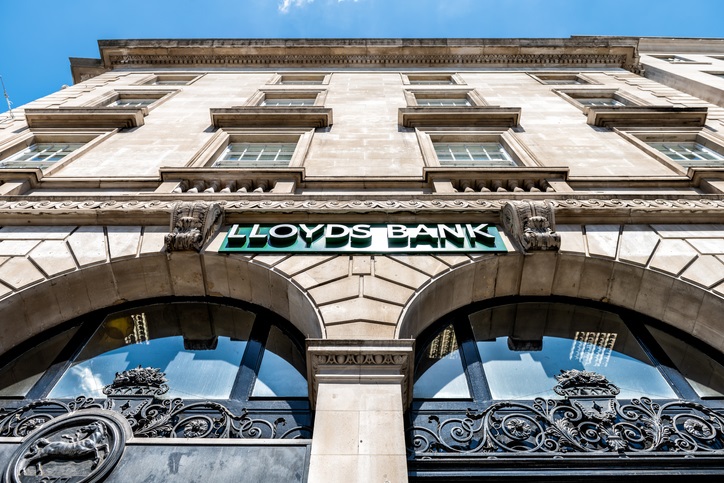Shares round-up: Lloyds, Apple, Amazon
Bank’s results boost hopes for sector return, while tech giants’ valuations are tested tonight.
29th October 2020 13:07
by Graeme Evans from interactive investor
Bank’s results boost hopes for sector return to form, while tech giants’ valuations will be tested tonight.

As good as the Q3 earnings season has been for Lloyds Banking Group (LSE:LLOY) and others, there's still no hiding place for investors amid the ramping up of Covid-19 restrictions across Europe.
Today's session showed the dilemma facing markets as heavyweight companies beat expectations by wide margins. However, sentiment remains extremely poor due to fears of another major demand shock as Covid-19 cases continue to surge in the UK and elsewhere.
The FTSE 100 index steadied after its 2.5% fall on Wednesday, but the mid-morning rise of 15.2 points to 5598.1 was far from convincing given that shares in Royal Dutch Shell (LSE:RDSB), Lloyds (LSE:LLOY) and BT Group (LSE:BT.A) were all sharply higher after the publication of well-received results.
Lloyds rose 4% to 28.86p after a recent surge in mortgage lending and better-than-expected loan defaults boosted the sector's hopes for a dividend return next year. NatWest (LSE:NWG), which is due to report figures tomorrow, was 2% higher at 118p.
Oil prices told the real story of the session, however, with a barrel of Brent crude down another 3% to $37 (£28.59) on expectations that more lockdowns will cause a slump in global demand.
- The Week Ahead: Lloyds Bank, Shell, BT, FAANG stocks
- Are Lloyds Bank and Tesco on list of best value stocks to buy?
The VIX index of implied US stock market volatility is also at its highest level since June and pricing daily swings of around 2.5% in the S&P 500 over the coming month.
Wall Street markets slumped by more than 3% last night, with the lofty valuations of tech giants including Apple and Amazon set to be tested tonight with earnings releases after the closing bell.
The opportunity for US fiscal stimulus is also definitely on hold until after next week's presidential election, meaning consumer spending is under threat if unemployment benefits run out.
Despite these jitters, Mark Haefele, chief investment officer at UBS Global Wealth Management, argues that now is not the time for investors to waver from their financial plans.
He said:
“While local restrictions to control the pandemic will be a drag on growth, we see several reasons to expect the effect is likely to be more limited than in the first half of the year.”
The first factor is that consumers and companies are now better placed than before to adapt to the more restrictive environment, although he concedes this is not universal as sectors such as air travel and hospitality have few means of adjusting.
- The stocks behind latest FTSE 100 plunge
- Take control of your retirement planning with our award-winning, low-cost Self-Invested Personal Pension (SIPP)
Haefele notes that fourth quarter estimates for the majority of US companies are rising, but that as Microsoft (NASDAQ:MSFT) has been one notable exception there are understandable fears that enterprise tech spending could be slowing from pandemic highs.
Overall, Haefele thinks the setback to risk assets is likely to be short-lived, particularly if the imminent launch of vaccines mean that virus restrictions can start to be lifted by the second quarter of 2021. UBS continues to target the S&P 500 at 3,700 by June, which is up 13% on today's level.
The note from UBS also recommends that investors take advantage of the market retreat to diversify into a broader range of tech firms that have the potential to gain from the pandemic fallout or changes to the global economy.
There are parts of the market that should outperform as the global recovery broadens, such as cyclical plays in US mid-caps or emerging market value stocks.
These articles are provided for information purposes only. Occasionally, an opinion about whether to buy or sell a specific investment may be provided by third parties. The content is not intended to be a personal recommendation to buy or sell any financial instrument or product, or to adopt any investment strategy as it is not provided based on an assessment of your investing knowledge and experience, your financial situation or your investment objectives. The value of your investments, and the income derived from them, may go down as well as up. You may not get back all the money that you invest. The investments referred to in this article may not be suitable for all investors, and if in doubt, an investor should seek advice from a qualified investment adviser.
Full performance can be found on the company or index summary page on the interactive investor website. Simply click on the company's or index name highlighted in the article.